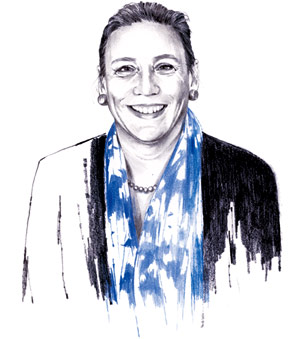
My father is a retired cardiovascular thoracic surgeon. My childhood memories are punctuated with instances of him being called away from home for emergency surgeries. On those days, and many others over his long career, he never questioned whether the patients whose lives he was trying to save were able to pay for his services. He had taken the oath to heal to the best of his ability all those who presented themselves—and he spent his career doing so.
My father is long retired, and I chose to pursue academia, not medicine. But I believe that the duties of those in healing and medicine are much the same: to serve those who present themselves—regardless of their ability to pay.
In higher education, we don’t—yet—have our own official version of the Hippocratic oath. But at Middlebury, we do have a mission that serves as our moral directive. In part, our mission declares that “through a commitment to immersive learning, we prepare students to lead engaged, consequential, and creative lives, contribute to their communities, and address the world’s most challenging problems.”
These students—our students—are increasingly coming to us requiring financial aid to make the full Middlebury experience accessible. In fact, this year 42 percent of our students received some kind of financial assistance to attend. This percentage is similar to, although on the low end, of what our peer colleges provide.
As a need-blind institution, Middlebury admits the most qualified students among our applicants. We also meet every enrolled student’s full demonstrated financial need—the cost of attending less the family’s estimated financial contribution. We are committed to each of these policies and to maintaining and strengthening our financial sustainability.
But rising inequality means that Middlebury needs to increase its ability to provide financially for our students.
As we educate young people across our schools to address the world’s most challenging problems, we must acknowledge that inequality is one of those problems. In the United States, income disparity is increasing. If current trends continue, soon top students will come mostly from places and families for whom a Middlebury education is beyond reach. But we must still continue to be able to reach them—and keep them. We must increase our efforts to make Middlebury a place of welcome, supporting all students so that they know that they belong.
That goes beyond support for the cost of attendance, and into support for the cost of experience. Being a Middlebury student means receiving an extraordinary, rewarding, and affirming education in and out of the classroom, with equal opportunities to participate in clubs and sports, internships and experience abroad, spiritual and religious life, and cultural and artistic expression. In doing so, we are changing and broadening the Middlebury experience to be more appealing to, and reflective and inclusive of, today’s and tomorrow’s student body.
Being a need-blind institution can help increase educational access for top students. But we are competing with our peer institutions to enroll these same students, and we are falling behind in our ability to do so. Currently, we rank 11th out of 16 in relation to our peers in the percentage of undergraduate students to whom we give financial aid.
It’s true that Middlebury is a college in demand. We received a record number of applications again this year. We could certainly fill each new incoming class with bright and motivated students whose families can afford to pay, and allow our peer colleges to enroll exceptional students with more limited financial means.
That is not an option, of course. We not only are a private institution of higher education, but we also represent a public good, something that is recognized explicitly by our not-for-profit status. A public good should be accessible to all, regardless of financial means. The need to increase our ability to provide financial aid is not exclusive to Middlebury, of course. However, how we respond to this need can be. We can draw on our history: from our beginnings, Middlebury has been about access—and the need to fund it. Middlebury was founded by teachers and preachers who were focused on making education available to those who were not afforded the federal funds given to UVM to found that university in the late 18th century.
Then, as now, Middlebury relied upon those who believed in the importance of education access to fund and maintain our mission. We are fortunate to have a high level of alumni and parent engagement, generous support from many sources, and to be guided by trustees and overseers whose foundational priorities are the twin goals of financial sustainability and financial aid.
Expect to hear more from me about what I believe is Middlebury’s duty to our current and future students and their families. As always, I welcome your thoughts.

Leave a Reply